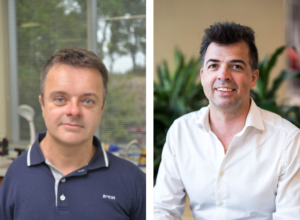
The funding will enable the MDRI to find solutions to prevent knee injury and secure new essential equipment to enhance research in biomechanics, orthopaedics and biomedical devices.
Flinders biomechanics researcher Dr Saulo Martelli secured a $368,636 ARC Discovery grant to investigate the ‘Virtual Human Knee’ which will inform understanding of knee mechanics to develop solutions to prevent knee injury and assess knee reconstruction and implantation surgery.
In true MDRI form, this project will bring together a collaboration of global experts from Flinders University, University of Adelaide, University of Sheffield UK and University of Denver USA.
Flinders biomechanics researcher Dr Egon Perilli led the successful $557,389 ARC Linkage, Infrastructure, Equipment and Facilities (LIEF) grant, for a ‘Large-volume multi-use micro computed tomography’ scanning machine. This is the highest 2018 LIEF grant to be awarded across SA and for which Dr Perilli secured a further $495,000 co-investment by Flinders University, The University of Adelaide and South Australian Museum.
MDRI Deputy Director Professor Mark Taylor said these grants will enable Flinders to build on its already successful orthopaedics research capabilities.
‘The MDRI is a leader in musculoskeletal research. We work closely with industry and other research organisations to enhance knowledge in orthopaedics, from fundamental research to understand the musculoskeletal disorders to the development of new surgical tools, techniques and decision support’ said Professor Taylor.
‘I applaud all the researchers involved, but in particular Dr Martelli and Dr Perilli for their hard work’.
The large-volume micro-CT scanner will be housed at Flinders University’s Tonsley campus and is expected to be operational by the end of 2018.
The MDRI is no stranger to housing vital equipment, home to the award-winning Six Degree of Freedom Hexapod Robot. The Hexapod is a precise testing system capable of producing either single-axis or multi-axis (e.g. bending + shear + rotation) displacements or rotations to any material, joint, implant or surgical device.
It is also home to the Flinders Advanced Surgical Training facility, a $2.1 million, state of the art, level 2 Physical Containment (PC2) compliant facility, where practicing surgeons can attend advanced training workshops to maintain and learn new surgical techniques.
In other news, Dr Egon Perilli was recently elected incoming president (2018-2021) of the Australian & New Zealand Orthopaedic Research Society.
More about the ARC Discovery Grant:
Dr Saulo Martelli (Flinders); Prof Mark Taylor (Flinders); A/Prof John Costi (Flinders); Dr Claudia Mazza (The University of Sheffield UK); Dr Kevin Shelburne (University of Denver); Prof Lucian Solomon (The University of Adelaide).
This project aims to generate the Virtual Human Knee (VHK) for providing a baseline knowledge about knee mechanics in adultss and a tool for studying knee mechanics in silico. The new knowledge can be used for identifying individuals most at risk for injury, developing solutions for preventing injury and for assessing knee reconstruction and implantation methods. As such, VHK will mitigate the burden of knee injury to Australia and worldwide by progressing disciplines including anatomy, bio-mechanics, sport science, rehabilitation, surgery and medical devices.
More about the ARC LIEF Grant:
The collaborators team put together by Dr Perilli includes experts in micro-CT imaging, biomechanics, computational modelling, structural engineering, composites, biology, palaeontology and anthropology: Dr Egon Perilli (Flinders), Prof Mark Taylor (Flinders), Prof John Long (Flinders); A/Prof Youhong Tang (Flinders), A/Prof Karl Sammut (Flinders), Prof Benjamin Cazzolato (The University of Adelaide), A/Prof Zonghan Xie (The University of Adelaide), Em/Prof Roger Seymour (The University of Adelaide), Dr Togay Ozbakkaloglu (The University of Adelaide), Dr Sarbin Ranjitkar (The University of Adelaide), Dr Mark Hutchinson (South Australian Museum).
This project aims to augment the existing X-ray micro-computed tomography (CT) scanning capabilities in South Australia and Australia by introducing a large-volume micro-CT scanner. This will enable 3D-scanning of large and heavy samples including human limbs/segments, prosthetic devices and machine parts, fossils and composites. This will allow experimental testing rigs to be placed inside the scanner, to test samples, such as biomechanical testing of femurs or medical devices, while scanning, to study the structure-function relationships. This will build unlimited computer simulations of mechanical tests, valuable for precious specimens.

